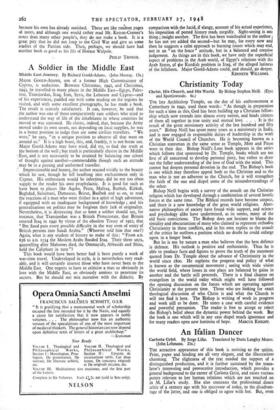A Soldier in the Middle East
Middle East Journey. By Richard Goold-Adams. (John Murray. 15s.)
MAJOR GOOLD-ADAMS, son of a former High Commissioner of Cyprus, is audacious. Between Christmas, 1942, and Christmas, 1943, he travelled in many places in the Middle East—Egypt, Pales- tine, Transjordan, Iraq, Iran, Syria, the Lebanon and Cyprus—and of his experiences, padded out with some reading on the regions he visited, and with some excellent photographs, he has made a book. The result is scarcely satisfactory. It can, however, be said that the author was one of those comparatively rare soldiers Who tried to understand the way of life of the inhabitants in whose countries he moved or was stationed. He claims, indeed, that, because the Army moved under its own steam, not depending on local supplies, he was in a better position to judge than are some civilian travellers. " We were," he says, "in a unique position to observe all that went on around us." It is a high boast, this, and, frankly, it is not borne out. Major Goold-Adams may have tried, did try, to find the truth at the bottom of the well ; but truth is particularly elusive in the Middle
• East, and is not necessarily to be attained by balancing one school of thought against another—commendable though such an attitude may be in a passing and uniformed' traveller.
Impressionable and honest, the author reacted vividly to the beauty which he saw, though he fell headlong into enchantment only in Cyprus. His enthusiasm would be infectious, did he not too often
• supply to the reader his own prophylactic. It is good for such as have been to places like Aqaba, Petra,' Mafraq, Rutbah, Kirkuk, Baghdad, Sulaimani, Damascus, Beirut, Baalbek and so on, to read the reactions of a man who went thither in a spirit of high adventure, if equipped with an inadequate background of knowledge ; and his generalisations on politics may be forgiven their lack of originality. Nevertheless, it is distressing that so keen a soldier should say, for instance, that Transjordan was a British Protectorate, that Britain entered Iraq in 1941 by virtue of the obsolete Treaty of 5922, that " Ibn Saud puts every possible difficulty in the way even of entry of British persons into Saudi Arabia." (Whoever told him that one?) Again, what is any student of history -to make of this : " From A.D. 636 to A.D. 1534 the Moslem Arabs flooded Iraq. Their three sects, quarrelling after Mahomet died, the Ommayids, Abbasids and Shias, held the Caliphate in turn "?
This book would have been better had it been purely a work of war-time travel. Undeveloped in style, it is nevertheless very read- able, and it will certainly interest those, who have never been to the Middle East. One regrets to have to criticise a man so obviously in love with the Middle East, so obviously anxious to penetrate its secrets. But he should not mix narrative with the didactic. By
comparison with the lucid, if slangy, account of his actual experience, his imposition of potted history reads turgidly. Sight-seeing is one thing ; insight another. The first has been vouchsafed to the author ; he has not yet added the second—but he may, for every now and then he suggests a calm approach to burning issues which may end, not in an "on the fence" attitude, but in a balanced and creative judgement. As things are in this book, we have only the superficial aspect of problems in the Arab world, of Egypt's relations with the Arab States, of the Kurdish problem in Iraq, of the alleged laziness of the fellaheen. Major Goold-Adams could, and should, go deeper.
KENNETH WILLiAMs.


































 Previous page
Previous page